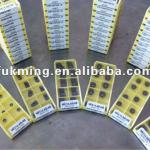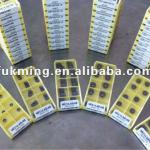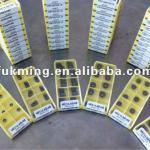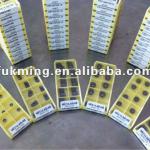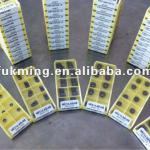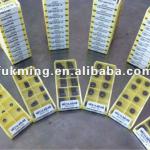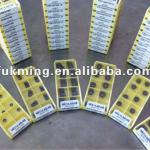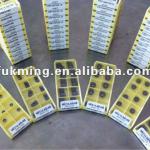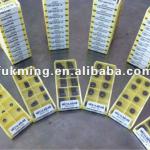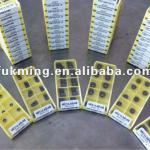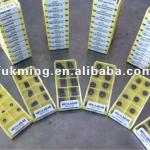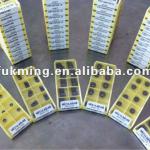Various Kinds of End mills,Drilling Cutter,Cutting Tools Manufacturer
| Place of Origin:Sichuan China (Mainland) | Brand Name:Ferre | Model Number:P20, P30, P35, P40, M10, M20, M30, M40, K01, K05, K10, K15 | Material:Tungsten Carbide |
| Usage:Internal Turning Tool | Hardness:ISO standard | Coating:depends on specific products | Cemented carbide cutting tools usage:Metal cutting ,stone cutting, fiberglass cutting,drilling, milling |
| Cemented carbide cutting tools size:Different sizes | Cemented carbide cutting tools design:Can be customsized | Cemented carbide cutting tools material:100% virgin material | Carbide cutting tools regular grade:YG6, YG8 |
| Cemented carbide cutting tools surface:Ground and unground |
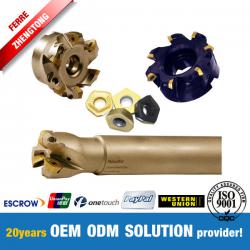
Various Kinds of End mills,Drilling Cutter,Cutting Tools Manufacturer
Cemented Carbide Cutting Tools Description:
The quality of a cutting tool can determine whether cuts will be smooth and clean or
difficult and sloppy. A metal cutting tool's quality begins with the hardness and
durability of its metal. According to the Society of Manufacturing Engineers, "carbide
and carbidecoated tools cut about three to five timesfaster than highspeed steels"
and "higher tungsten content increases wear resistance." Tungsten carbide cutting
tools can be widely used in metal cutting ,stone cutting, fiberglass cutting,drilling,
milling and more.In addition to products displayed on our website, we are able to
manufacture custom tools as per your unique specifications.
Cemented Carbide Cutting Tools Grades and properties:
Cemented Carbide Cutting Tools Category We Can Supply:
1) CNC tools
2) PCD tools
3) Carbide inserts
4) Welding inserts
5) Drill Bits
6) Turning inserts
7) Indexable inserts
8) Threading inserts
9) End mills
10) Grooving inserts
11) Carbide bur
12) Cutting-off inserts
Cemented Carbide Cutting Tools Display:
Q:What is cemented carbide ?
A:Cemented carbide is a hard material used in machining tough materials such as carbon steel or
stainless, as well as in situations where other tools would wear away, such as high-quantity
production runs. Most of the time, carbide will leave a better finish on the part, and allow faster
machining. Carbide tools can also withstand higher temperatures than standard high speed steel tools.
Q:What is the difference between cemented and tungsten carbide?
A:Cemented carbides consist of hard grains of the carbides of transition metals (Ti, V, Cr, Zr, Mo,
Nb, Hf, Ta, and/or W) cemented or bound together by a softer metallic binder consisting of Co,
Ni, and/or Fe (or alloys of these metals). Tungsten carbide (WC), on the other hand, is a compound
of W and C. Since most of the commercially important cemented carbides are based on WC as
the hard phase, the terms "cemented carbide" and "tungsten carbide" are often used interchangeably.
Q:What are the key properties of cemented carbides I should be concerned with when
selecting a grade for my application?
A: The key properties of cemented carbides that define their performance level for different
applications include abrasion resistance (directly related to the hardness of the grade),
fracture strength, and fracture toughness. In general, the abrasion resistance or hardness of any grade
is inversely proportional to its fracture toughness. Very often grade selection involves finding the best
compromise between abrasion resistance and toughness. In some instances strength and corrosion
resistance can be important factors in the grade selection process.
Q:Which grade characteristics affect the properties of cemented carbide?
A: The properties of cemented carbides are affected by four primary material characteristics,
namely, (i) the average grain size of the carbide phase, (ii) the weight or volume percent of the
binder alloy present, (iii) the composition of the carbide phases, and (iv) the composition of the
binder alloy. In general, hardness increases (and fracture toughness decreases) as the average hard
phase grain size decreases and/or the weight or volume fraction of the binder decreases.
The strength increases as the average grain size of hard phase decreases at any given binder fraction.
Corrosion resistance increases as Ni and/or Cr is substituted for Co in the binder alloy.
Q:Which properties are important in metal cutting applications?
A: Depending upon the type of metalcutting operation (turning, milling, drilling, etc.), different
combinations of properties is needed in order to obtain optimum results. For example, in turning
and drilling applications the cutting tool is in continuous contact with the workpiece. Hence,
for these applications, abrasion resistance and strength are the most important properties to consider.
However, in operations such as milling, which invariably involve interrupted cutting, and hence high
impact forces, toughness can be an important factor. Grades employed for metalcutting applications
are usually based on fine to medium hard phase grain sizes (0.5 to 1.5 mm) and low to medium
Co contents (6 to 15 wt.%).
Q:Are grades used for cutting nonferrous metals different from those used for ferrous metals?
A: Yes. Grades used for cutting nonferrous metals are usually based on WC as the hard phase and
Co as the binder phase. On the other hand, grades used for cutting ferrous metals usually contain
other hard carbides (e.g., TiC, TaC, NbC, etc.) besides WC. The presence of the TiC, TaC, NbC, etc.
is useful in preventing chemical interactions between the ferrous metals and the cutting tool (which can
lead to cratering on the surface of the tool). In addition, carbides such as TiC, TaC, NbC, etc.
can help increase the hot hardness and strength of cemented carbides.
Q:Which grades are useful in metal forming applications?
A: In contrast to metalcutting (where abrasion resistance and strength are of paramount importance),
cemented carbides used in metalforming applications will invariably be subject to high impact and
shock forces. Hence, grades used for metalforming applications must possess high toughness levels
with adequate abrasion resistance and strength. Grades employed for metalforming applications are
typically based on coarse grain sizes (3 to 8 mm) and high binder contents (15 to 30 wt. %).
Q:Which grades are useful in earth drilling or boring applications?
A: In many respects the characteristics of the grades employed for earth drilling and boring
represent a compromise between the characteristics that are important for metalcutting and those that
are important for metalforming applications. Grades for earth drilling and boring must possess
the highest toughness levels for any given abrasion resistance level, while simultaneously possessing
adequate strength levels. The best compromise is usually arrived at by using grades that are based on
coarse grain sizes (3 to 8 mm) and relatively low Co levels (6 to 16 wt. %).
Q: How can I choose the most suitable products for my applications?
A:1. Correct installation site depends on specific size and drawings. Especially for dies processing,
drawings can ensure the finished products are qualified.
2. Processing objects and working environment is determined by cemented carbide grades.
Products' lifetime can be greatly extend if grades are right.
cutting tools manufa
cutting tools manufacturer, cutting tools manufacturer,cutting tools manufacturer,cutting tools manufacturer,cutting tools manufacturer,cutting tools manufacturer,cutting tools manufacturer, cutting tools manufacturer,cutting tools manufacturer, cutting tools manufacturer,cutting tools manufacturer,cutting tools manufacturer,cutting tools manufacturer,cutting tools manufacturer,cutting tools manufacturer, cutting tools manufacturer,cutting tools manufacturer, cutting tools manufacturer,cutting tools manufacturer,cutting tools manufacturer,cutting tools manufacturer,cutting tools manufacturer,cutting tools manufacturer,cutting tools manufacturer,cutting tools manufacturer, cutting tools manufacturer,cutting tools manufacturer,cutting tools manufacturer,

| Packaging Detail:Cemented carbide cutting tools packing:1)Cemented carbide cutting tools inner packing: plastic boxes,2)Cemented carbide cutting tools outer packing: wooden cases |
| Delivery Detail:Cemented carbide cutting tools can be delivery in 20 days |



